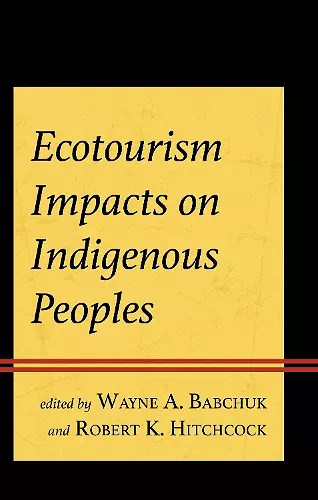Ecotourism Impacts on Indigenous Peoples
Robert K Hitchcock editor Wayne A Babchuk editor
Format:Hardback
Publisher:Bloomsbury Publishing PLC
Published:30th Nov '24
Currently unavailable, and unfortunately no date known when it will be back

This book examines the effects of ecotourism on Indigenous peoples chronicling the costs and benefits of ecotourism from a comparative and anthropological perspective.
Ecotourism, defined as responsible travel to natural areas that conserves the environment and improves the well-being of local people, has become one of the fastest growing industries in the world. The impacts of ecotourism on people in virtually every part of the planet are particularly true for Indigenous people. Indigenous people are found in over half of the world’s countries and their cultures, customs, traditions, identities, and natural resource management systems are of great interest to scientists, tourists, and travelers. Many Indigenous peoples reside in conservation hotspots and places with high biological biodiversity. As shown in this book, ecotourism has both promises and pitfalls for Indigenous peoples, who seek to enhance their livelihoods while conserving the habitats in which they reside and the sacredness of their traditions. Drawing on cases from South America, North America, Africa, and Asia, Ecotourism Impacts on Indigenous Peoples examines the social, economic, political, and environmental impacts of ecotourism. A common plea of Indigenous people is that they have greater control over incoming ecotourists and receive more equitable social, economic, and cultural benefits from what they recognize as a highly complex industry with significant environmental, economic, and political effects.
A highly readable book that illustrates how Indigenous peoples are proactively engaging with modernity, tourists, law makers, each other, and forms of governance. -- Keyan G. Tomaselli, University of Johannesburg. Author of Cultural Tourism and Identity: Rethinking Indigeneity
A comprehensive and insightful examination of ecotourism's impact on Indigenous communities worldwide. The case studies in this collection deftly explore both the promises and pitfalls of sustainable tourism, providing essential reading for anyone interested in responsible travel and cultural preservation. -- Keri Vacanti Brondo, University of Memphis
Babchuk and Hitchcock have compiled an extremely important collection on the intersection of two inextricably linked bodies of work that are rarely explicitly considered within the literature—ecotourism and Indigenous peoples ... Libraries with collections focusing on tourism, cultural heritage, indigeneity, and geography should have a copy of this text. Highly recommended. * CHOICE *
- Winner of Choice Outstanding Academic Title 2025 (United States)
ISBN: 9781793643841
Dimensions: unknown
Weight: unknown
262 pages